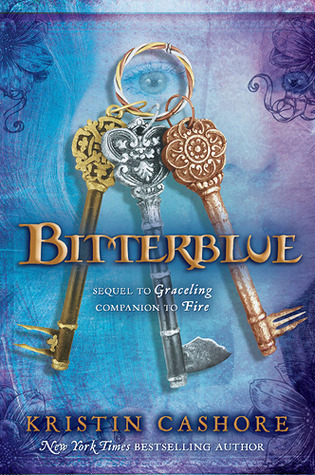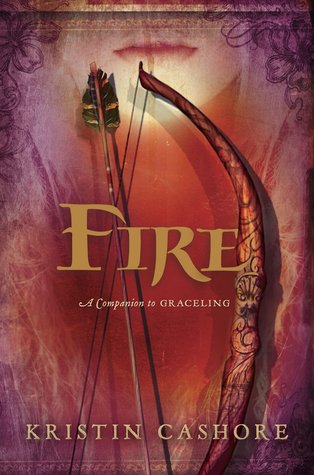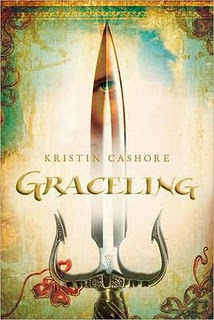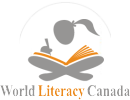
Ana's Rating
Readers Rating
Eight years after Graceling, Bitterblue is now queen of Monsea. But the influence of her father, a violent psychopath with mind-altering abilities, lives on. Her advisors, who have run things since Leck died, believe in a forward-thinking plan: Pardon all who committed terrible acts under Leck’s reign, and forget anything bad ever happened. But when Bitterblue begins sneaking outside the castle—disguised and alone—to walk the streets of her own city, she starts realizing that the kingdom has been under the thirty-five-year spell of a madman, and the only way to move forward is to revisit the past.
Two thieves, who only steal what has already been stolen, change her life forever. They hold a key to the truth of Leck’s reign. And one of them, with an extreme skill called a Grace that he hasn’t yet identified, holds a key to her heart.
I’m going to begin this review by stating that I am in general disagreement with most reviewers out there when it comes to Bitterblue. I love this book, and despite (or perhaps in spite) of all of its negative reviews, I’m going to sing praise here. You’ve been warned.
As this is the third book in the Graceling Realm series, I think that we’ve already established that this world building is really freaking amazing. What with the kingdoms, the castles, the bridges, the Gracelings… I’m really starting to wonder why I don’t read more fantasy. Contemporary reads hold no competition when it comes to this element.
I really love Bitterblue as a character. Contrary to Miss Cashore’s other protagonists, Bitterblue has no super powers. She’s not graced with fighting, or with survival. Her hair does not captivate and dumbfound those around her. No, she’s just a normal girl– who happens to be a queen. It is for this reason, I believe, that I find Bitterblue so easy to relate to. She made me laugh, she made me cry, she made me try exciting new hairstyles involving a headful of braids… just see for yourself.
“I hear that you’re supposed to be good at manipulating people. Try a little harder to make me like you, all right? I’m the queen. Your life will be nicer if I like you.
“I threw a few chickens around before I came up the ladder,” he said. “You didn’t hear them making a racket?”
“I was distracted by the conviction that I was going to die.”
If a situation presented itself in which the right and the wrong seemed clear to her, then she was going to grab on tight. The world presented too few anchors for her to let one pass.
Bitterblue isn’t the only character who I enjoyed. Cashore’s recurring cast, involving Po, Skye, Giddon, Katsa, Raffin and Bann, was absolutely delightful. It was strange—in a wonderful type-way—to see them as a bunch of almost-30-year-olds, but I was terribly happy to see them regardless.
As for Bitterblue‘s romantic scene, I agree that it’s not exactly… prevalent. Bitterblue and Saf’s relationship, though crucial to the novel’s plot, never takes precedence over other subplots and does not develop in the ways that Graceling‘s and Fire‘s romances so obviously did. However, as Kristin Cashore has pointed out herself, this is due to the simple fact that Bitterblue is the queen of Monsea. She’s struggling to find solid ground in a kingdom whose most recent past has been submerged in a sea of lies and battling to forge a relationship with her people, whom she’s discovering she doesn’t know in the least. And let’s not forget that, as queen, Bitterblue will be expected to marry nobility and produce heirs sometime in the near future. That’s a lot of pressure to put on a teenage girl; if boy craze were at the forefront of Bitterblue’s mind, I’d
have been worried.
Furthermore, others have blatantly suggested that Bitterblue, at 547 pages (hardcover edition), is exorbitantly long and unbearably boring. Apparently, its subplots are too unruly and its mystery is too hard to follow, and so the whole novel becomes an unreadable mess. To say that I am in disagreement with this supposition is too weak; I’ve been glued to this book for the past three days. Literally. My family and I went out to dinner yesterday, and I read Bitterblue under the table until my grandmother tsked a warning and then, after a few minutes, yelled at me. I guess that indulging oneself in riveting novels is rude. In any case, even at 547 pages, I was sad to see Bitterblue end.
Because, the truth is, this ending was very unsatisfactory. So many loose ends were left untied, and my mind is filled with questions. What will become of Saf and Bitterblue’s extremely unclear relationship? What about the Council—will it succeed in its work? And that land to the east—what of its relationship with Monsea and the rest of the known world?
Honestly, what is with Kristin Cashore and her non-endings? The number 1 problem with each of her books is their major
cliffhanger finales. The least she can do at this point is grace us with another Graceling Realm book. No, seriously. I’m not kidding. I need another Graceling Realm book. Soon.
Bitterblue merits 4.8/5 stars. For fans of majorly awesome world building, a riveting plot, and ungraceful final outcomes.
I’ll keep you posted,

Ana's Rating
Readers Rating
It is not a peaceful time in the Dells. The young King Nash clings to his throne while rebel lords in the north and south build armies to unseat him. The mountains and forests are filled with spies and thieves and lawless men.
This is where Fire lives. With a wild, irresistible appearance and hair the color of flame, Fire is the last remaining human monster. Equally hated and adored, she has the unique ability to control minds, but she guards her power, unwilling to steal the secrets of innocent people. Especially when she has so many of her own.
Then Prince Brigan comes to bring her to King City. The royal family needs her help to uncover the plot against the king. Far away from home, Fire begins to realize there’s more to her power than she ever dreamed. Her power could save the kingdom.
If only she weren’t afraid of becoming the monster her father was.
Fire’s father was not a kind man. Cansrel was not loyal, or compassionate, or gentle. Manipulating the king, killing the women he slept with so he would not reproduce, and basically leading the Dells to ruin, he was not particularly nice. But Cansrel forgot to murder Fire’s mother, so he was left with his monster child, Fire.
Fire’s father was not a kind man. But he loved her nonetheless. And maybe that’s why this story, having only existed as a result of Cansrel, is such an interesting one. Can a person who loves another person really be evil?
While coming to terms with her past and her present, Fire proved to have unusual depth. Her moral debates, her strange acceptance of all things bad in the world, and her refusing to use her powers was captivating. Did I not mention her powers? Being a monster, Fire is a gorgeous creature whose beauty enables her to control the minds of those around her. However, because she was dually raised by Cansrel and her neighbor Brocker, Fire has a strong moral compass that prevents her from using her powers in anything but self-defense. The way Fire improved herself throughout the novel was also interesting, although a slight setback of this improvement 85% of the way through the book was dissapointing and inconsistent. I feel like Fire went from being a good if slightly hurt character, to facing her present, to facing her past, to becoming totally useless, and then back again.
I have only one other issue with Fire:
Raptor monsters can fly, right? So how come no raptors have ever made their way through the mountains to the the Seven Kingdoms, especially since Fire takes place before Graceling?
But back to the praise…
Brigan was an enrapturing character. I loved that, even towards the beginning of the novel, you really got to see behind his ‘tough war commander’ facade. As I found out more about his past, I became even more entranced with him.
The other members of the royal family were equally deep and amusing. Nash was charismatic and just the tiniest bit like his puppet father Nax. Clara was bubbly, sweet and perceptive. Garan was… well, in one word, severe. But he had a lighter side as well. And Roen was insightful, honest, kind and motherly.
I also loved the Dells. The uprising of Lords Mydogg and Gentian was perfect; these characters were genuine and their actions were realistic. If our real, non-fictional world were subjected to the reign of Cansrel and Nax, as were the Dells, I can very easily imagine our society responding as did Cashore’s. Some people would try to gain power stupidly, as did Gentian. Some would be more clever in trying to become more powerful, such as Mydogg. Some would ally themselves with the throne and put their all into peace, like Fire. And some would simply sit back and wait to see who their new ruler would become.
Fire‘s mystery was so much more well written than that of Graceling. It was way better thought out, a lot more suspenseful and very engaging and engrossing. The prologue, a hint to the solution of the mystery, was very creepy and strangely fitting.
Fire merits 4.3/5 stars. For fans of Cashore’s first book, Graceling, and political intrigue. The only reason that I’m not rating it as well as I did Graceling is because the plot and the pacing were somewhat lacking.
I’ll keep you posted,

Ana's Rating
Readers Rating
Katsa has been able to kill a man with her bare hands since she was eight–she’s a Graceling, one of the rare people in her land born with an extreme skill. As niece of the king, she should be able to live a life of privilege, but Graced as she is with killing, she is forced to work as the king’s thug.
When she first meets Prince Po, Graced with combat skills, Katsa has no hint of how her life is about to change.
She never expects to become Po’s friend.
She never expects to learn a new truth about her own Grace–or about a terrible secret that lies hidden far away…
In the land of the Seven Kingdoms, few people are Graced, able to excel at a certain talent. Those who are, however, are feared, shunned, and given to their king, so he may use them to his advantage. Some Graces are banal–such as the ability to juggle or sing particularly well.
And some Graces are fatal.
Katsa is Graced with killing. She is forced to deal out King Randa’s punishments by dismembering, maiming and publicly murdering those who disregard his will. She is known throughout the Kingdoms as King Randa of the Middluns’s Lady Killer: Dangerous. Cruel. Unbeaten.
But one day, while doing buisness for the Council, a committee that Katsa began in order to save the Kingdoms from their arrogant kings, Katsa meets her match. Prince Po, Graced with combat skills, is an opponent that Katsa has difficulty beating. (Difficulty! Unheard of!) This brings the two of them into an unlikely friendship that changes the course of the future of the Seven Kingdoms.
Graceling is an amazing book. The characters had distinctive personalities and depth. The idea of Graces was so original. Not once did I ever think “Hmm. This idea was better executed in this book. This plot resembles that of this book.” No, Graceling was completely refreshing and new.
The world building. Whoa. Wow. Dang. This is the kind of world building that I fawn over, gush over, and talk about for weeks. This is the kind of world building that deserves a medal, a trophy, or in the very least, a recommendation. The Seven Kingdoms all have individual landscapes and tendencies. The kings are realistically portrayed as power-hungry and arrogant. The land has just enough chaos to seem genuine, but not enough so that the Kingdoms actively engage in war. The paranoia, fear and shunning of Graces is truthfully depicted–I can imagine the same attitude towards them if they appeared in our world.
I’ve read so many reviews bashing on Katsa. I don’t agree with them. Yes, Katsa has trouble controlling her temper and probably needs anger management. Yes, she’s physically violent . Yes, she can be selfish. Yes, she has a deep fear of commitment and relationships. Yes, she never outgrew the tom-boy phase most girls go through at some point in their lives, and therefore rejects dresses, jewelry and pretty hair.
This makes Katsa harder to relate to, but it doesn’t make her any less realistic.
I’ve also read some reviews claiming that Katsa has no-strings-attached sex with another character. This is not the case. Katsa has feelings for this character, she cares about him, and they have sex. Just because they do not wish to get married, which is an offense in Cashore’s somewhat-medieval world, does not make their relationship any less credible. If Katsa believes that getting married is losing herself, so be it. I appreciate her honesty and her self-respect. Besides, look at most young adults today: do they form relationships only in the hopes of getting married? No. They date because they like each other, they’d like to explore their feelings, and being with someone who likes you is better than being alone.
Only a couple of things could have been improved in Graceling:
1: How Cashore gives hints towards the solutions of some mysteries, but doesn’t give readers enough time to figure them out on their own. She could have left, at the bare minimum, one or two chapters between the presentation of the mystery and the hints towards its solution, and another 2 chapters between the hints and the solution itself. This would have increased Graceling‘s suspense and kept more people interested.
2: The ending. There’s not supposed to be a second book about Katsa and Po, but I found Graceling‘s ending to be somewhat of a cliffhanger.
My final statement: An amazing book. For everybody. 4.9/5 stars.
I’ll keep you posted,


![[Twitter]](http://www.whatyareading.com/wp-content/plugins/bookmarkify/twitter.png)

